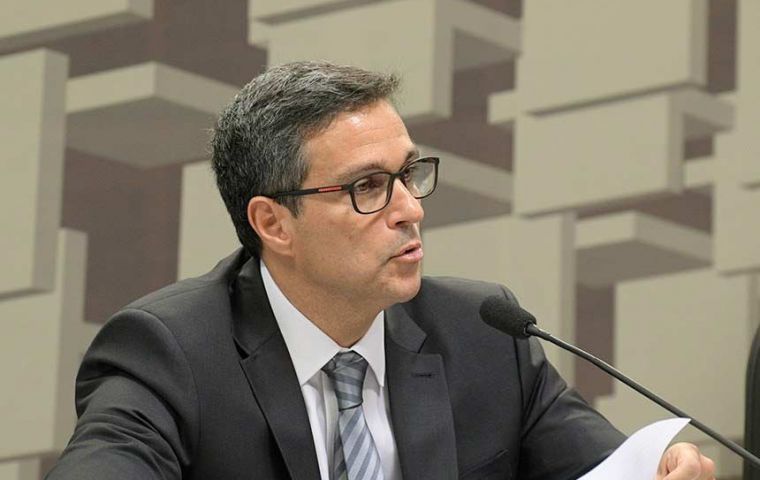MercoPress. South Atlantic News Agency
Brazilian central bank keeps Selic rate at 13,75%; anticipates hawkish approach to combat future inflation
 Chair Roberto Campos Neto and Copom are concerned about the economic impact of past rate hikes, and investor anxiety about Brazil’s weakening spending outlook
Chair Roberto Campos Neto and Copom are concerned about the economic impact of past rate hikes, and investor anxiety about Brazil’s weakening spending outlook The Brazilian central bank maintained the benchmark Selic at 13.75% for a third consecutive meeting this week, as expected by all analysts. It was the last rate meeting before Lula da Silva assumes the country’s presidency on January first.
In a statement accompanying the decision, COPOM board members reiterated they will hold rates steady for “a sufficiently long period” and will not hesitate to resume hikes if inflation doesn’t slow as planned.
“The current scenario, particularly uncertain on the fiscal side, requires serenity when evaluating risks,” they wrote. “The Committee will closely monitor future developments in fiscal policy and, in particular, its effects on asset prices and inflation expectations, with potential impacts on the dynamics of future inflation.”
Board members led by Roberto Campos Neto are considering, on one hand, the delayed economic impact of past rate hikes, and growing investor anxiety about Brazil’s weakening spending outlook on the other. Such concerns are leading economists to revise up inflation estimates for 2023 and traders to price in new rate hikes starting in February.
“They are more worried about the future developments in fiscal policy and the effect on asset prices and inflation expectations,” said Mirella Hirakawa, an economist at AZ Quest Investimentos. “Their consumer price expectations went up, and that’s also a hawkish message.”
Congress is currently debating a bill that would raise the public spending cap by roughly 145 billion Reais (US$ 28 billion) to help finance Lula’s campaign pledges, including payouts to the poor. In that context, Campos Neto has called for “coordination” between fiscal and monetary policies, warning that uncertainty on public expenditures may harm employment and activity.
Policymakers see inflation risks stemming from “heightened” uncertainty about future fiscal rules and more stimulus. Despite a recent inflation slowdown, consumer prices are still rising at a fast pace and core measures remain elevated, they wrote.
Annual inflation eased to 6.17% in early November from over 12% earlier this year, according to the national statistics agency. Still, transportation costs rose again, indicating that the impact from tax cuts on costs of utilities and fuel are waning, and economists see consumer prices rising above target through 2024.
The central bank board raised its own 2023 inflation forecast to 5% from 4.8% before, above that year’s target of 3.25%. They also lifted the estimate for 2024 to 3%, in line the goal for that year.
Policymakers see faster inflation even after third-quarter data indicated a more moderate pace of economic expansion. Board members also highlighted prospects of below-potential growth for the global economy next year.
“The central bank has an outlook for greater inflationary persistence,” said Leonardo Costa, an economist at Asa Investments. “Our outlook is for the Selic to remain steady at 13.75% through all of 2023.”




Top Comments
Disclaimer & comment rulesCommenting for this story is now closed.
If you have a Facebook account, become a fan and comment on our Facebook Page!